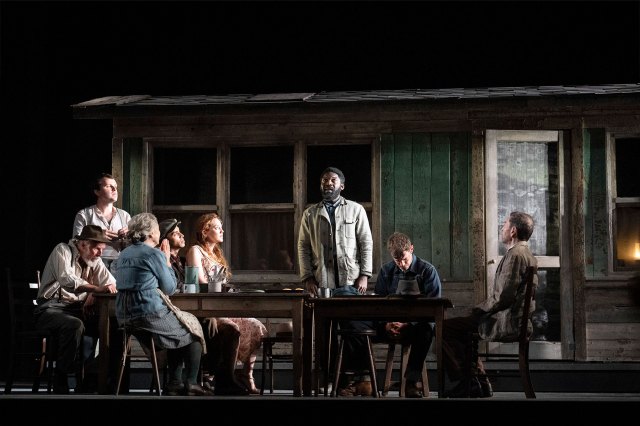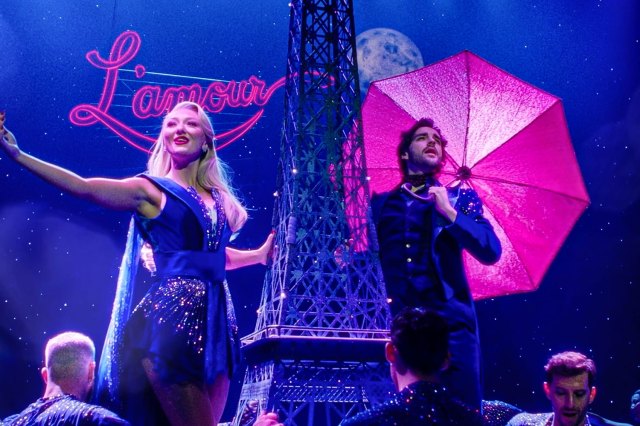The Grapes of Wrath at the National Theatre review – Cherry Jones excels in an uneven production
Carrie Cracknell’s revival runs until 14 September

The undesirable underbelly of the American Dream has seldom looked as bleak as it does in this version of John Steinbeck’s classic 1939 novel. Frank Galati’s adaption won the 1990 Tony Award for Best Play and now arrives at the National with a new folk score by Maimuna Memon, whose soaring, plaintive vocals are a persistent motif throughout Carrie Cracknell’s operatic, uneven staging.
The tale of the Joad family’s epic trek across Depression-era America in search of a better life in California, a story typical of so many bands of migrant workers of the period, isn’t easy to sit through, and nor should it be. Steinbeck’s sweeping narrative is a timely reminder of how the greed of the very few can lead to the destitution of so many, and along the way, we get violent deaths, stillbirth, flooding and starvation.
Reducing a 600-page novel down to three hours stage time is an ambitious undertaking, but Galati has done a creditable job. While certain characters and plot developments have been excised, the sense of humans being tested to the limits of their endurance remains potent, as does a sense of wonder at the sheer scale of an America that can elevate or crush individuals, and where the dividing line between getting by and total despair is easily crossed.
Cracknell’s production has an enthralling, wordless opening section (movement direction by Ira Mandela Siobhan) that matches the beginning of the novel, with cast members, bodies splayed and taut at unnatural angles to the stage, railing desperately against the giant billowing dust winds that perished crops and spelled financial doom for farming folk. It’s a rousing, terrifying scene setter, but its striking theatricality is seldom matched by anything that follows.
Certainly there are unforgettable moments where Cracknell seems hellbent on staging the unstageable, such as a young woman giving birth in a barn in the midst of a fearsome thunderstorm while the men outside toil to build fortifications against a rising torrent of water, or the entire Joad tribe and all their belongings clinging on to their rickety vehicle as they drive off towards the great open sky. But there are also points where the ambition and scale of the work seem to defeat the creative team and we are left with interminable sections of flat, uninspired action.

The return to the London stage of American acting royalty Cherry Jones, however, is a cause for celebration. She plays indomitable Ma Joad and is every inch the woman Steinbeck describes (“the citadel of the family, the strong place that could not be taken…if she swayed the family shook”) in a selfless, still, utterly unsentimental performance of tremendous gravitas and truth. Although some of the accents aren’t fully convincing, there’s beautiful work from Greg Hicks as her husband, Mirren Mack as her pregnant daughter and Christopher Godwin as the irascible, defeated patriarch.
If Harry Treadaway’s parole convict Tom suffers initially from the duel constraints of the inarticulacy of Steinbeck’s character and the mammoth scale of the production, he eventually finds something simultaneously noble and wild in this troubled young man. Natey Jones is vividly tormented as the Christ-like former preacher who befriends him.
Like the book, the play closes with the image of the young mother who has lost her baby breastfeeding a starving middle-aged man because her milk is the only nourishment available, which remains as ambiguous and troublingly intimate as ever. Is Steinbeck making the point that the poor will share the very last of what they have? Is it about survival? Perhaps wisely, neither play nor production try to provide a definitive answer.
What this Grapes of Wrath ultimately leaves us with is the unmistakable sense of being in the presence of greatness, but of not having fully got to grips with its source material. For all the astonishing and sometimes beautiful stage pictures, the understated brilliance of Jones’s performance, and the haunting musicality, I’m not convinced that this isn’t a story that is better told on page or screen.
















